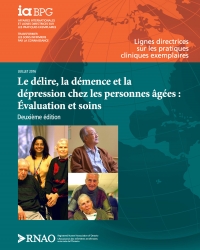The guideline focuses on:
- Practice recommendations: directed primarily toward nurses who provide direct clinical care to older adults across the spectrum of care, including (but not limited to): primary care, acute care, home-care settings, alternative level of care/complex continuing care, and long-term care. The secondary audience of the practice recommendations includes other members of the interprofessional team who collaborate with nurses to provide comprehensive care. All of the recommendations are applicable to the scope of practice of registered nurses and nurse practitioners (general and extended class); however, many are also applicable to other members of the interprofessional team.
- Education recommendations: directed at those who are responsible for the education of health-care providers, such as educators, quality improvement teams, managers, administrators, and academic and professional institutions. These recommendations outline core content and training strategies required for entry-level health-care programs, ongoing education, and professional development. The primary focus is nurses, and the secondary focus is interprofessional team members.
- Organization and policy recommendations: apply to managers, administrators, and policy-makers who are responsible for developing policy or securing the supports required within health-care organizations that enable the implementation of best practices.
For optimal effectiveness, recommendations in these three areas should be implemented together.

